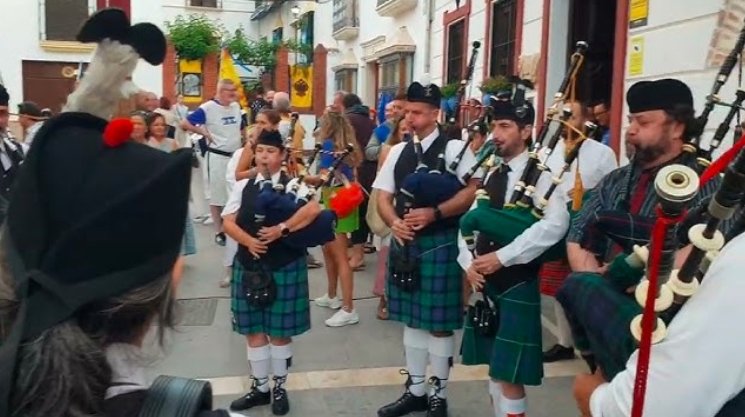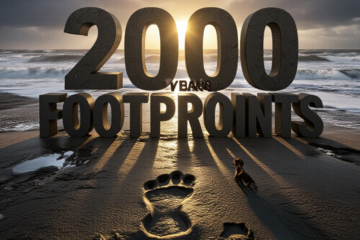In the heart of Andalusia, the small town of Teba in Malaga province transformed into a slice of Scotland from August 21 to 24, 2025, for the 19th Douglas Days festival. Thousands gathered to honor Sir James Douglas, a 14th-century Scottish knight who died in battle there, through reenactments, music, and cultural events that blend history with fun.
The Historic Tale Behind the Celebration
Sir James Douglas, known as the Black Douglas, was a key figure in Scotland’s fight for independence alongside Robert the Bruce. In 1330, he carried Bruce’s embalmed heart to the Holy Land but joined a crusade in Spain instead, dying in the Battle of Teba against Moorish forces.
This event shaped Teba’s history, as Douglas’s bravery helped capture the Castillo de la Estrella. Today, the festival revives this story, drawing visitors eager to learn about this unique Scottish-Spanish link. Local leaders note how it highlights Teba’s role in medieval conflicts between Christian kingdoms and the Nasrid dynasty of Granada.
The celebration has grown over two decades, earning recognition as a Festival of Tourist Interest from Malaga’s provincial council. It ties into broader trends of historical tourism in Spain, where towns like Teba use past events to boost local economies amid rising interest in cultural heritage trips.

Festival Activities Bring History to Life
Crowds of about 10,000 people, triple Teba’s population of around 3,500, flocked to the 2025 edition. Events kicked off with a medieval market featuring crafts, food stalls, and traditional Scottish attire like kilts.
Historical reenactments stole the show, with actors portraying the Battle of Teba and Douglas’s final moments. Celtic music filled the air, including bagpipe performances and concerts by bands blending Scottish and Andalusian sounds. Workshops taught skills like archery and sword fighting, while kids enjoyed games inspired by medieval times.
A highlight was the twinning ceremony with Melrose, Scotland, Douglas’s hometown. Delegates exchanged gifts, strengthening bonds that began years ago. Gastronomy mixed haggis with tapas, offering a fusion feast that surprised and delighted attendees.
Key Events and Schedule Breakdown
To make the most of Douglas Days, visitors followed a packed program that balanced education and entertainment. Here’s a quick look at the main activities from the 2025 festival:
| Day | Morning Events | Afternoon Events | Evening Highlights |
|---|---|---|---|
| August 21 | Opening parade with bagpipes | Medieval market setup and workshops | Celtic music concert and twinning ceremony |
| August 22 | Historical talks on Sir James Douglas | Archery and swordplay demos | Battle reenactment and fireworks |
| August 23 | Children’s games and storytelling | Craft fairs and food tastings | Traditional Scottish dance night |
| August 24 | Guided tours of Castillo de la Estrella | Closing market | Farewell gala with international guests |
This schedule helped families plan visits, with free entry to most events. Organizers adapted for the hot Andalusian weather by scheduling outdoor activities in cooler hours.
Community Impact and Visitor Experiences
Local residents play a big role, volunteering to decorate streets with Scottish flags and prepare costumes. Business owners like bar proprietors see a surge in customers, with some reporting sales doubling during the festival.
One visitor shared how the event sparked interest in genealogy, tracing family ties to Scottish roots. It also promotes tourism in the Guadalteba region, known for its olive groves and hiking trails. The festival ties into Spain’s push for rural revival, countering urban migration by showcasing unique traditions.
Economically, it generates thousands in revenue, supporting jobs in hospitality and crafts. Attendees praise the welcoming vibe, noting how it educates while entertaining, much like similar heritage festivals in Europe.
Beyond fun, Douglas Days fosters cultural exchange. Scottish visitors often join, sharing stories that bridge the 700-year gap. This year, a group from Melrose brought artifacts, enriching the historical narrative.
Why Teba’s Festival Stands Out
What sets Douglas Days apart is its blend of authenticity and accessibility. Unlike larger events, it feels intimate, allowing personal interactions with performers and locals.
Travelers can explore nearby attractions, such as the castle ruins offering panoramic views. The festival aligns with growing interest in offbeat European celebrations, appealing to those seeking alternatives to crowded tourist spots.
For history buffs, it provides a tangible link to the Crusades and Scotland’s independence wars. Practical tips include wearing comfortable shoes for walking Teba’s hilly streets and booking accommodations early, as options fill up fast.
Looking Ahead to Future Editions
As the 2025 festival wrapped up, plans for 2026 are already underway, with ideas to include more interactive tech like virtual reality tours of the battle. This evolution keeps it fresh while honoring the past.
The event’s success shows how small towns can thrive by embracing their stories. It inspires similar initiatives elsewhere, proving history can unite people across borders.
Share your thoughts on Douglas Days or your own festival experiences in the comments below. If you enjoyed this article, pass it along to friends who love history and travel.


















